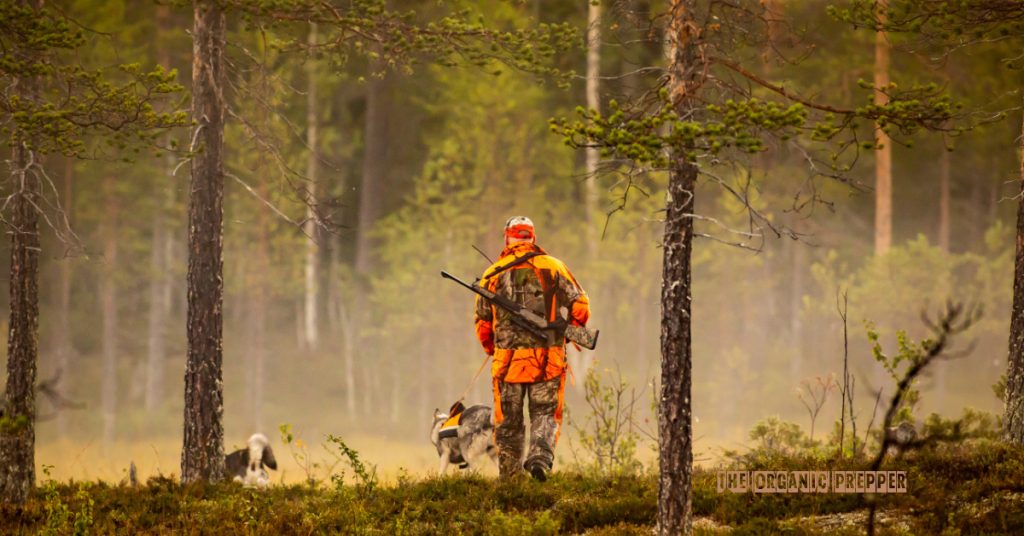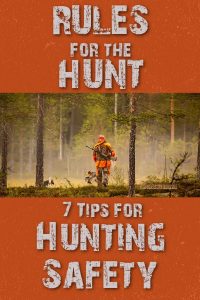If you're new here, you may want to subscribe to my RSS feed. Thanks for visiting!
by Jordan McDowell
When you’re new to hunting, prepping for your trip is an exciting time. It’s easy and fun to imagine the trophy buck you might bag, the time in the great outdoors, and the psychological thrill of the hunt. But most people don’t imagine the possible dangers that can befall hunters and those nearby. Hunting and firearm accidents can and do happen, so it’s best to learn hunting safety precautions before you pack up your gear and hit the early dawn treestand.
Here are seven hunting safety tips that can help save a life or keep you and others from injury.
1) Practice Firearm Safety
Many hunting accidents are due to hunters being careless with their weapons. Firearm safety should be learned well before you fire your first gun.
Here are the basics of firearm safety that are taught in any hunting safety course:
- Always treat your firearm as if it was loaded.
- Keep your safety on until you’re ready to shoot.
- Keep your finger off and away from the trigger until you’re ready to fire.
- Keep the muzzle of your gun pointed in a safe direction and never at another person.
- Be absolutely sure of your target. Never confuse game with a person or pets.
- Be aware of what is beyond your target. Never shoot close to another person or a dwelling.
Learn and memorize these firearm safety tips and preach them to fellow hunters.
2) Know Your Weapon
Whether you’re hunting with a firearm or a bow, knowing your weapon inside and out is very important. Before hunting, become familiar with shooting your weapon and properly maintaining it. Firearms should be cleaned after each use. Bows — longbows, recurve, and compound bows — need to have their bow strings waxed and replaced regularly.
It’s a good idea to take a firearm to a shooting range to get a good feel for the recoil and to practice aiming. Learn where your firearm safety mechanism is and how to use it. You’ll also want to learn the specific types of ammo that you can use in your weapon and what type of game each works best for.
3) Keep Your Cell Phone on Your Person
While gun incidents account for many hunting safety accidents, even more may be caused by falling from treestands. If your cell phone is in your backpack up in the treestand, it won’t do you any good when you’re injured down on the ground. Always keep your cell phone charged and in your pocket so you can call for help if needed for any reason. (Assuming you are within range of a cell tower and have service.)
4) Practice Treestand Safety
When entering, sitting in, and exiting a treestand, a full-body harness should be worn. Many hunters make the mistake of removing their harness when sitting or standing in the treestand, and this is when falls can occur. Many hunters leave their treestands in place year after year, and the weather and frequent use can take their toll. Be sure to inspect your treestand at least once a year. Check the steps, the harness, and any parts that might get worn or loose.
5) Wear Blaze Orange
Yes, blaze orange can break up your camouflage, but it’s extremely important to wear the proper amount of blaze orange. The bright blaze orange helps alert other hunters to your position and that you’re not a potential game.
You’ll also want to dress your hunting dogs in blaze orange for their own safety. Even if you’re hunting on your own private property, you never know what other people or hunters might be mistakenly passing through.
6) Alert Others About Your Trip
A cell phone won’t always help you, especially if you’re entering an area that doesn’t get cell reception. Tell at least one other person where you’re going and when you plan to be back. When you’re done with your trip, let them know. If you don’t tell them you’re home safely and something has indeed gone wrong, they may be the saving lifeline that helps bring you home alive.
7) Check the Weather and Bring Safety Gear
When hunting in northern regions in the winter months, snowstorms can easily blow through, causing disaster for hunters in remote areas. Moisture can cause hypothermia quickly. Bring the appropriate safety gear for your hunting trip, which might include:
- Extra clothing
- Rain gear
- Emergency blanket
- Water-proof fire-starting kit
- First aid kit
- Cellphone or satellite messenger in a waterproof bag
- Water and snacks
- A whistle
Be prepared to prevent and handle cold weather injuries.
Hunting Safety Courses
Most states require you to complete a hunting safety course prior to purchasing your hunting license. Some courses can be completed online and take about three hours to complete. The knowledge you can learn from in-person or online hunting safety training courses can be an invaluable addition to your hunting safety knowledge. Signing up for a hunting safety course is a fun and smart idea for all beginning hunters.
Hunting safety is for everyone, whether they’re 16 or 60 years old. And when hunting safety is learned, it’s even better to pass your knowledge on to the next generation of hunters. When hunting accidents are reduced, and game guidelines are followed, the public image of hunters is seen as conservationists contributing to healthy natural ecosystems.
Do you plan to go hunting this year? Do you have any other tips to add to this list? Have you ever run into trouble when out hunting? Please share your advice and stories in the comments.
About Jordan
Jordan McDowell is a writer and Second Amendment rights advocate. As a proud advocate for responsible gun rights nationwide, he writes about recreational hunting as well as the latest developments in state and national legislation. Check out Jordan’s work at https://

















I would say that a very important hunting safety rule is don’t poach on someone else’s land.
We have a big problem every year with poachers in our area. They start scouting for places a month or so before opening day. We have learned how to recognize the scouts, and will stop them to have a chat about how we deal with poachers.
Another tip is to keep your DNR agent on speed dial. We love our game warden, and he appreciates being apprised of poachers.
How do you know they are a poacher ? A poacher is some one who sells meat for profit, they might be hunting for food ! which means its O.K. to hunt what God made for man to eat. (Survival) Its God who made the animals for mans needs, NOT the Government, and they don’t own the animals either. Government always wants to be God and replace the true God. That’s the satanic agenda of Government, just think of all they want and do control already, then ask yourself where is my freedom gone ?
I’m not a hunter. I grew up in a family that was very anti-gun. As a result, I have never gone hunting. But I cannot support what Robert says here.
If everyone went out and hunted just for food, shortly the deer would be hunted to extinction. There are just too many humans. Even the Indians (Native Americans) hunted some animals to extinction. The reason there are limits to hunting seasons and numbers of hunters allowed to hunt (licenses) is not because of government ownership, but to allow enough animals to survive to produce a new crop the next year. This is not satanic.
Poaching is whenever someone hunts outside the law, whether stealing deer on private land or taking deer without a license. The same with any other animal.
I had a run in with out of state hunters stealing my Deer.
I was out numbered, they won, havent been hunting since.
These are all great tips that are always worth mentioning. I was out for a short while this morning, and even though I was on my own property, I still wore orange. You never know when someone is going to be where they aren’t supposed to be.
Don’t fire at:
1. Movement
2. Sound
There have been multiple incidences of deer shooters (and campers) in New Zealand being tragically been killed by other shooters or even members from their own hunting group due to poor target identification.